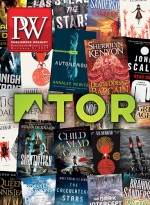Bestselling author Amy Tan discusses her new memoir, Where the Past Begins (Ecco, Oct.).
You’re best known for your fiction. What prompted you to write a memoir?
I was finishing one book and was about to start another, but my editor, Dan Halpern, suggested I do an in-between nonfiction book. He said it would be easy; we’d use our email exchanges about writing. I was against the idea at first because I didn’t think it would add up to a book and it would be more like a self-congratulatory indulgence. I feared I’d be self-conscious.
How did the shape of the book come about?
I had 10 or more pieces beyond those in this book. My editor saw this connection between the past and the present in the pieces we’ve included that revealed the origins of who I was as a writer. One day he sent me an email saying, “Where the Past Begins by Amy Tan.” I thought that was very cheeky of him to come up with the title of my book! I write in a fugue state, and I don’t remember what I’ve written, but this was a line in a piece I’d sent him. He said, “That’s what your book is about!”
You say that writing becomes harder with each novel. Why?
I know so much more about writing and so I’m much more critical. I’m not naive the way I was when I started. In retrospect you can’t get rid of what you know and what you fear. Starting out writing is like learning to swim: you delight in it. But when you’ve had a number of experiences where you’ve nearly drowned you’re fearful and overwhelmed. And that’s what happens to me. I’m aware of the times when I’ve struggled and nearly drowned in my writing, and that is stiffling.
Do you feel you are wiser now than when you started your writing career?
I don’t think I’ll ever reach an age when I say I’m wiser. With age you can actually become stupider because you can become intractable.
You’ve observed that the process of writing is “the painful recovery of things that are lost.” Was this book painful?
Extremely. I think that’s why I was very reluctant to have it published, because everything about it was so fresh and painful and I needed to protect it more. During the writing I was often left shaking, crying, and dazed. But I was also able to go back and be with the person I was at the time and say, “Yeah that was wrong and shouldn’t have happened,” and cry about it. At the same time I’m an adult saying, “How interesting that you resisted people’s expectations, and how good is that!”



 Volume 264
Issue 41
10/09/2017
Volume 264
Issue 41
10/09/2017





